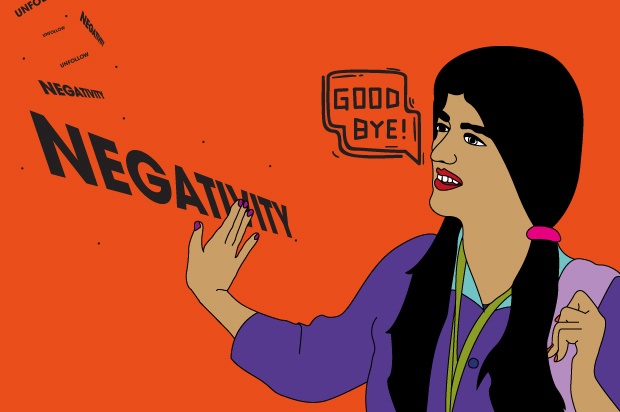Social Media Makes Me Feel Bad About My Body

The world of social media can get intense.
It’s normal to find yourself thinking life would be easier if only you looked a bit more like the people you follow on social media. But that doesn’t mean it’s healthy or harmless. Research has proven that constant exposure to images of idealised bods does our self-esteem zero favours. So how exactly does social media affect our self-image? And what can we do to prevent it from making us feel crappy?
Comparing bodies is normal… to an extent
It’s human nature to compare. People have always compared the way they look to friends, to what they see in magazines, and what we see on TV. The difference is, we now have the internet and social media stuffing hot bods in our face all day long. There is no let-up and as a result, we become trapped in a constant cycle of worrying we don’t look as good as the people we see online. Unsurprisingly this leaves us feeling pretty crappy. So how exactly does social media make us feel worse about the way look?
- It makes us forget what normal is. Anyone who has social media knows, we tend to only post photos where we’re looking fly. Therefore we’re bombarded on a daily basis by unrealistic images of people who have been photoshopped, filtered and beauty-faced to the maximus, skewing our perception of what normal is.
- We have a massive pool of people to compare ourselves against. Back in the day, you would have had your friendship group and the odd magazine picture to compare yourself against. Now we’re offered a pool of celebrities, models and social media influencers to oggle at.
- It’s constant. Because we’re often signed up to several social media platforms and it’s the way we communicate and socialise, we never get a break from looking at photos of hotties.
What’s the harm?
Before long, scrolling through endless pics of #thighgaps, #gymselfies and #sixpacks is going to grind you down. These photos are often billed as #fitspiration, but in reality, they do a pretty fine job of making us feel inferior.
The other issue is that social media offers a safe space for nasty trolls to anonymously say hurtful things about the way people look. Whether people have left mean comments about the way you look or you’ve read mean comments about the way celebrities look, it all creates a pretty toxic environment, leaving us even more insecure about our bodies. Some other, more extreme risks of constantly comparing ourselves include:
- Eating disorders and body dysmorphia. Fixating on the way we look can eventually, in extreme cases, lead to life-threatening conditions like anorexia, body dysmorphia and bulimia. It might also lead to unhealthy behaviours like crash dieting and overexercising.
- Depression and anxiety. Lots of people who spend a long time on social media will report feeling low or developing depression or anxiety.
Cultivating a happier self-image
If you don’t feel good about the way you look and you think social media is playing a part, the key is to break that obsessive, social media bubble people often find themselves trapped inside. Step one to doing this is getting off your phone for five mins and getting into the street. Once you’re phoneless and in the street, ask yourself – are there ripped, perfect bods everywhere you look? Hell no! The world is made up of all kinds of bods and that’s what makes it interesting. So remember:
- Take a break from social media. It’s an obvious one, we know, but spending less time comparing yourself is the most effective thing you can do if it’s causing harm. If banning it altogether feels scary, how about experimenting with a week-long break (or even just a few days) to see how you feel afterwards? If you feel a little better, that should be motivation to spend less time online.
- Curate your social media feed. If getting off your phone altogether is too much to ask, make a conscious effort to ‘clean up’ your social media accounts. This means unfollowing the accounts you know encourage you to compare. It also means following new accounts that promote self-compassion and body positivity. Follow accounts which aren’t about bodies – who doesn’t love oggling cute dogs, travel destinations and yummy food?
- Stop internal negative chat. Every time you catch yourself telling yourself you’re not buff enough, stop. right. there. Instead, boost your self-esteem by telling yourself five things you like about yourself. Remember, these things don’t have to be about your appearance. Ie. I’m pretty amazing at dancing, my friends tell me I’m funny, I’m compassionate, I’m loved by my family, I cook a mean Bolognese.
- Remember the internet is weird. It can be helpful to remind yourself what a weird place the internet is and how full of bollocks it is. Read our article on how to stay sane online.
Next Steps
- The Self-Esteem Team (SET) run workshops in schools across the UK to help tackle young people's issues with body image, self-worth and mental health.
- You can talk to Childline about anything. Call them for free on 0800 1111 or visit their website.
- Chat about this subject on our Discussion Boards.
By Olivia Capadose
Updated on 13-May-2019
No featured article














